Logan Lucky Review
Back To Basics For Soderbergh
Released : August 25th 2017
Certificate : 12A
Director : Steven Soderbergh
Cast : Channing Tatum, Adam Driver, Daniel Craig, Riley Keough
Plot : Two veteran brothers living in West Virginia, who are locally known to be cursed, fall on hard times. They decided to rob the Charlotte Motor Speedway in North Carolina.
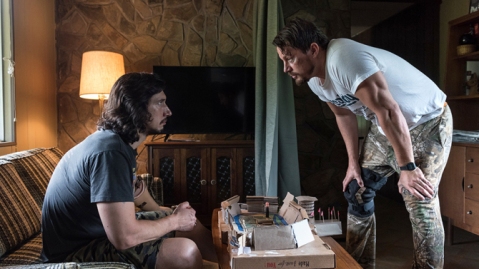
SPOILER WARNING – Review contains allusions to the ending of the film.
After stating four years ago upon the release of Side Effects that he would be retiring from film-making due to the ‘horrific’ way the industry treats directors, Soderbergh returns with another heist comedy. Other complaints that the director had about the industry revolved around how commercially driven the industry has become and how this effected creative freedom. Knowing these facts when watching the film, changes the experience. The way two outsiders try to take on the big corporation, elements of the ending, and the overall quirky creative nature of the film, all makes sense given the directors stated attitudes.
The review tag line which has been most widely circulated is ‘its Coen’s meets Oceans’, and atmospherically it is clear to see why. If a direct film comparison could be made, it would be Barton Fink, due to the way both films are statements about the issues of film making, although Barton Fink does so much more explicitly. Logan Lucky does it as follows. The film isn’t very marketable on paper, the protagonists are unusual and outsiders, the humour isn’t mainstream and is often subtle, and the ending of the film has a definite statement about large corporations and their morality. These features make total sense when you consider Soderbergh complaints about the industry, that it’s become too mainstream, money obsessed, and lacking creativity. So, it appears he made a film that addressed these issues in a very subtle way. To push back in a small way against the film industry, he refuses to use conventional heroic handsome main characters, he doesn’t stay to the ‘accepted’ style of modern comedy, and he ends the film with a middle finger to corporations.
On top of this, the film is distributed by Soderbergh own private company (ensuring creative freedom) and the writer behind the film is a Rebecca Blunt, who is widely believed to be a pseudonym. Enough on the underlying messages of the film, does it function as an entertaining comedy heist. Absolutely. Whoever wrote the film, the script is brilliant. Combining character driven humour and situational comedy and topping it off with a huge amount of deep South American caricatures. Making this a clever and quirky comedy. This style won’t suit all mainstream audiences, as it isn’t as obvious and loud as other comedies out now, such as The Hitman’s Bodyguard. However, there’s definitely enough good laughs here for it to find an audience (or even become a cult hit). As for flaws in the script, the dramatic and emotional tones that come in towards the end aren’t very impactful. Also the overall structure and path of the film isn’t surprising and does stick very much to the Oceans formula.
As for the cast, all actors are relishing the roles very much. Many of the characters are larger than life, and many are clear caricatures. Due to the writing, Adam Driver and Daniel Craig will be the roles remembered from this film, as they are simply given more humour dialogue than Channing Tatum. Having said that, both Driver and Craig are brilliant in this film, being able to be believably portray their eccentric mannerisms and ticks which helps the humour land. These features make this one of the most quotable films recently, for all the right reasons. Seth MacFarlane accent and character can be forgiven. There is also the welcome addition of supporting roles from Hilary Swank and Sebastian Stan.
There’s plenty to really love here. While the film does follow the old Oceans formula very much, it is self-aware in this manner, with a standout line from a reporter in the film being ‘their calling it Oceans 7/11’. With great characters and great laughs this film will have you smiling on the way out of the theatre. Hopefully the success of this film will convince Soderbergh to put off that retirement a little longer.
Verdict : Despite Kermode saying the film is just high quality throw away fun, there are signs here that suggest a deeper meaning about the film industry. A great return for Soderbergh.
Verdict : 4/5
Quote : ‘Did you just say cauliflower to me?’
The Nice Guys Mini Review
Released : June 3rd 2016
Certificate : 15
Director : Shane Black
Cast : Ryan Gosling, Russel Crowe, Angourie Rice, Margaret Qualley, Matt Bomer
Plot : In 1977 Los Angeles a private investigator (Gosling) teams up with fist of hire enforcer (Crowe) after their paths cross due to two merging cases, the disappearance of a girl and the death of a porn star.
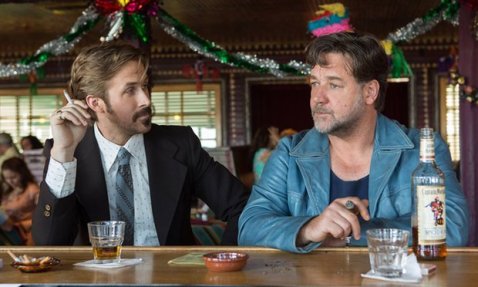
Shane Black, an writer director who is behind Lethal Weapon, The Long Kiss Goodnight, Kiss Kiss Bang Bang and Iron Man 3, is returning to the buddy cop structure for another period piece comedy. Adding to his list of A list actors to his film, he has opted for Ryan Gosling for the depressed, alcoholic, private detective single dad. And Russel Crowe for the aimless, struggling alcoholic, angry enforcer.
For Shane Black fans, or people who are aware of his work, it is difficult not to compare the film to his past work as a reference point for how good The Nice Guys is. Given that here the standard hasn’t lapsed as well as the formula and tone, it is largely down to personal preference which film remains as Blacks best. As The Nice Guys is another shinning example of Blacks ability to construct brilliant (and funny) set action pieces, wit and blunt humour of the script and a diluted plot that serves a chaotic backdrop of our duo.
Gosling and Crowe work brilliantly together, but given Blacks record with creating the perfect on screen duo, this is to be expected. This makes you wonder whether its down the actors chemistry, or that is just a by product of Blacks script writing process. For the duo dynamic, what might be felt for some is a slight lapse in quality from Kiss Kiss Bang Bang, due to these characters being less original than KKBB. But this isn’t down to Ryan and Russel’s effort, by any means. Neither one of them shines more than the other, as both actors approach the film with the perfect amount of character commitment and professional playfulness to bring both the verbal and non-verbal humour jumping of the screen.
Flaws with the film are limited, due to the fact that it is contains such an infectious amount of energy and wit that Black always brings.But some hypercritical could argue that it is a rehash of past buddy cop films or that down to personal taste it doesn’t hit their funny bone. This is a very niche audience thou, as The Nice Guys is a huge fan and general audience pleaser.
Verdict : A film that’s a irresistible comedic treat, with a period piece set that is a great move for Black.
Verdict : 4/5
Mini review: Deadpool
Year: 2016
Certificate: 15
Director: Tim Miller
Screenwriters: Rhett Reese, Paul Wernick
Cast: Ryan Reynolds, Morena Baccarin, Ed Skrein, TJ Miller, Gina Carano, Karan Soni, Brianna Hildebrand, Stefan Kapicic

Ryan Reynolds finally finds his metier as Wade Wilson, a smart-mouthed thug for hire turned superhuman on the hunt for revenge against the man who tortured and disfigured him. Fast-paced, sharp and hyperbolically violent, Deadpool explodes out of the gate with a slow-mo car-crash fight sequence set to the strains of Juice Newton’s Angel of the Morning, and proceeds to flash back, forwards and sideways to fill in the recent history of its vengeful protagonist. Reynolds- who, despite his considerable aptitude as an actor, has heretofore been pushed from pillar to post in Hollywood- is a revelation here, his physicality and voice acting adding up to a magnetic performance underneath Deadpool’s bright red and black mask. Director Tim Miller does an admirable job of keeping a firm hand on the tiller while driving the action forward at such a pace that it’s easy not to notice until afterwards how generic the story actually is. Disappointingly, despite Deadpool’s eagerness to poke fun at the foibles of superhero movies (quips about green spandex and the straight-lacedness of the X-Men abound), it makes little effort to subvert that genre’s underlying tropes. A case in point is Wade’s girlfriend Vanessa (Morenna Baccarin), whose ‘dream girl/ damsel in distress/ prize for the hero’ story arc couldn’t be more clichéd, a fact not quite remedied by her sharp tongue and Baccarin’s admittedly strong performance.
Verdict: 4/5
Image credit: foxmovies.com
Review: Grandma
Year: 2015
Certificate: 15
Director: Paul Weitz
Screenwriter: Paul Weitz
Cast: Lily Tomlin, Julia Garner, Judy Greer, Marcia Gay Harden, Laverne Cox, Sam Elliott
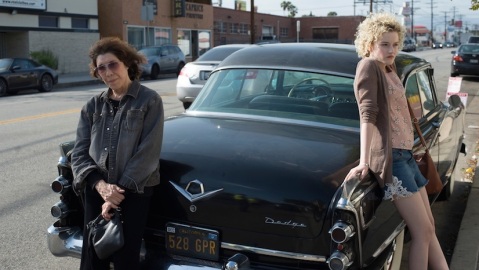
A welcome return to the big screen for Lily Tomlin, Grandma is a beautifully balanced comedic drama in which Tomlin’s retired (and broke) poet Elle sets out on a quest to call in enough favours to raise the money necessary to procure an abortion for her teenage granddaughter, Sage (Judy Greer). Their progress is hampered by the havoc (past and present) wreaked by Elle’s flashbulb temper, and the skeletons in Elle’s closet which begin to rattle as, becoming increasingly desperate, she turns to more and more tenuous connections for help.
Despite the simple premise, Weitz’s film is a work of surprising delicacy, bringing together its seemingly disparate strands of pathos, frank wit and almost knockabout comedy in a way that never feels mishandled. Garner’s sage is a perfect comic foil for the mercurial Elle, providing the audience with a perspective through which to view Elle’s antics with affection as well as incredulity. Garner’s performance is note-perfect, with the spot-on comic timing of her facial expressions providing a counterpoint to Elle’s bursts of temper. In fact, Grandma is consistently funny throughout, with moments of absurdity both underscoring the verisimilitude of the drama (one of the best sight gags I’ve ever seen involving a toy truck occurs in the midst of a bitter reunion between Elle and an ex-lover) and providing a light counterpoint to the film’s more serious elements.
As displayed in his earlier work (most notably 2002’s About a Boy and 2013’s Admission), Weitz has a keen eye for interpersonal relationships, and one of Grandma’s triumphs is its exploration of the complicated web of familial and social connections surrounding Elle. While barely discussed directly, it becomes clear that the death of Elle’s partner of 38 years, Violet, weighs heavily on her, and this loss has fractured the already strained relationship between Elle and her daughter Judy (Marcia Gay Harden). It also causes her to pull back from a fledgling love affair with a younger woman, Olivia (Judy Greer), and the break-up which forms the first scene of the film has lasting consequences.
It is an absolute pleasure (and a rare one) to watch a film which affords such dignity and grants such complexity to an older, female protagonist. Elle is allowed to be by turns relatable and alien, warm and abrasive, and the subtle character development that occurs as she is forced to confront the trail of destruction that her acerbic temperament has wrought is utterly compelling. In fact, despite its wide supporting cast (including accomplished turns from Laverne Cox and Sam Elliott) and lean running time, all of the characters in Grandma feel like real people whose lives continue outside of the frame. Tobias Datum’s unobtrusive and naturalistic camerawork adds to this, placing the audience as almost fly-on-the-wall observers of the unfolding social drama.
Verdict: 5/5
Image credit: sonyclassics.com
Mini review: Joy
Year: 2015
Certificate: 12A
Director: David O Russell
Screenwriter: David O Russell
Cast: Jennifer Lawrence, Robert DeNiro, Dascha Polanco, Bradley Cooper, Isabella Rossellini

David O Russell and Jennifer Lawrence’s latest collaboration is a frustratingly histrionic dramedy loosely based on the life of Joy Mogano, inventor of the self-wringing mop. While Lawrence is- as always- note perfect and the supporting cast all put in strong performances, O Russell’s love of surreal hyperbole obstructs rather than enhances what should be an inspiring story. While there are several strong sequences (such as a particularly fist-pumping late-stage confrontation with a rival businessman), it feels overlong at just over two hours and one can’t help but feel a little more simplicity and a little less self-aware oddness would have created a more cogent piece.
Verdict: 3/5
Image credit: foxmovies.com
Mini review: Sisters
Year: 2015
Certificate: 15
Director: Jason Moore
Screenwriter: Paula Pell
Cast: Amy Poehler, Tina Fey, Ike Barinholtz, Maya Rudolph, Madison Davenport.
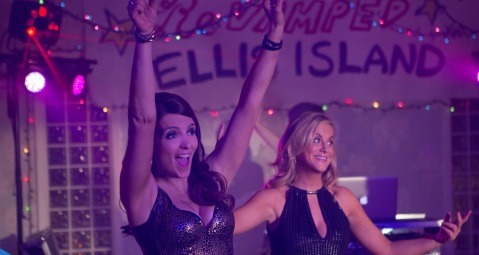
Comedy dream team Fey and Poehler star as the titular siblings who, upon learning that their parents are selling the family home, decide to throw one last house party to relive those teenage years.
This kind of situational comedy Fey and Poehler can do in their sleep, and it’s good fun to see them off the leash for a rare R-rated venture. Fey plays deliciously against type as the 40-going-on-14 beautician Kate, a comic foil to Poehler’s pathologically sensible ‘party mom’ Maura. Although the plot- a chalk and cheese sisterly dynamic, drunken antics and a will-they-won’t-they romance – is nothing new, the script, coupled with Fey and Poehler’s improv, is sharp enough to deliver plenty of laughs and even a few surprises.
Verdict: 4/5
Image credit: sistersmovie.co.uk
Mini review: Barash
Year: 2015
Certificate: N/A
Director: Michal Vinik
Screenwriter: Michal Vinik
Cast: Sivan Noam Shimon, Jade Sakori, Dvir Benedek, Irit Pashtan, Bar Ben Vakil, Reut Akkerman
Stuck between her well-meaning but overbearing parents and her wayward, army-enlisted older sister, the eponymous Naama Barash (Sivan Noam Shimon) is struggling to piece together her own identity amid the chaos of her family life. A burgeoning romance with the rebellious Dana (Jade Sakori) offers respite from her family, but young love brings with it its own complications.
Taking a deliberate stride away from the overly dramatic tropes of canonical lesbian romances, Barash is a surprisingly sweet coming-of-age tale set in a small town in Israel. The two young leads, both newcomers, provide energetic and authentic performances, and the ups and downs of their whirlwind romance are joyous and heartbreaking to follow by turns. Cinematographer Shai Peleg’s intimate and loose camerawork perfectly evokes the experience of heady adolescence. In more reflective moments, when the camera lingers on Shimon’s face, Naama’s internal state is brilliantly communicated. Outside of the core romance, the subplot of the search for Naama’s missing sister Liora (Ben Bar Vakil), while played equally for its wry familial comedy as its encroaching sense of disaster, fleshes out the narrative nicely. It both allows for an exploration of Naama’s loving but chaotic family, and of some of the social issues at play in modern Israli society.
Although the character arc is fairly standard coming-of-age fare, the refusal to set Jade and Naama’s relationship up as some kind of pretentiously posited all-encompassing love and the subtle exploration of the wider society in which the story operates lend a weight Vinik’s directorial debut. Currently doing the rounds at film festivals, here’s hoping it’ll get a wider distribution before too long.
Verdict: 4/5
Image credit: lamafilms.com
Review: Mistress America
Year: 2015
Certificate: 15
Director: Noah Baumbach
Screenwriter: Noah Baumbach and Greta Gerwig
Cast: Greta Gerwig, Lola Kirke, Matthew Shear, Jasmine Cephas Jones, Heather Lind, Michael Chernus
The latest feature from the increasingly prolific Noah Baumbach completes a loose trilogy (along with 2012’s Frances Ha and last year’s While We’re Young) focused around themes of friendship, ageing and ambition. Here, eighteen year old Tracy (played with a steely acuity by newcomer Lola Kirke) feels adrift at university in a New York that has not lived up to her expectations. At her mother’s behest she gets in touch with her soon-to-be stepsister Brooke Cardinas and the two quickly form a strong bond.
Moving away from the mumblecore realism of Frances Ha, Baumbach and Gerwig’s second co-written screenplay is at once more slickly delivered and more surreal. The screwball trappings- myopic mystics, impromptu drives to Connecticut and pie-throwing society initiations- are underpinned by an intelligent exploration of the twists and turns of a sudden and intense (albeit platonic) connection. The farce is elegantly played by the cast who succeed in sending up the ridiculousness of collegiate, bohemian and yuppie society, and the machinations of the main players are captured elegantly by Baumbach’s nimble direction. The plot gallops along and the jokes predominantly hit their mark eliciting regular titters as well as the occasional guffaw.
The chemistry between Gerwig and Kirke is electric, the former delivering a characteristically physical performance which gracefully toes the line between grating and endearing; the latter perfectly embodying the dissonance between Tracy’s emotional infatuation with Brooke and her intellectual knowledge of Brooke’s foibles. Brooke is a magnificent creation- the personification of the vacuity and self-serving capriciousness of the millennial generation; her growing desperation hastily papered over by twitterati bluster and blind self-belief. While this may sound fairly monstrous, Gerwig’s talent is to inject enough charm into her to keep her if not always likeable then at least engaging. She may be flawed, but she is also gregarious and cheerful. This is aided by the device of seeing Brooke through Tracy’s eyes. Like the audience, Tracy can sense that Brooke’s haphazardly constructed life may be about to crumble on its loose foundations (the semi-autobiographical short story Tracy bangs out after their first weekend together forms a meta-narrative of the film) but is nevertheless drawn to her.
Mining the same seam as 2014’s While We’re Young, Mistress America provides similarly bittersweet meditations on the passing of time. Brooke’s insistence that despite the twelve year age gap she and Tracy are contemporaries is belied by her melancholy observations on the inverse nature of the relationship between potential and desire as time progresses. Mistress America posits that coming-of-age tales can be told of all generations: Brooke must wrestle with her transition into adulthood proper with the same ferocity as Tracy tries to find her feet in college.
Verdict: 4/5
Quote: ‘Adultery!? You’re eighteen! You should all be touching each other all the time!’
Image credit: facebook.com/MistressAmericaMovie
Inherent Vice DVD Review
American Kerfuffle
Released : January 30th 2015
Certificate : 15
Director : Paul Thomas Anderson
Cast : Josh Brolin, Joaquin Phoenix, Benicio Del Toro, Reese Witherspoon, Owen Wilson, Martin Short, Jena Malone, Katherine Waterson
Plot : Set in 1970’s California, stoner private detective Larry “Doc” Sportello (Phoenix) is visited by a past girlfriend, Shasta (Waterson), who tells him of a plot in which her lover, restate typhoon Mickey Wolfmann, is at risk of being wrongly committed into a mental institution. While Doc investigates both Mickey and Shasta disappear, leaving him scrambling for the truth.
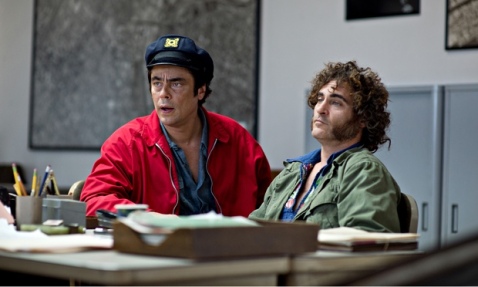
Acclaimed director Paul Thomas Anderson takes a leave from the more serious side of cinema, after producing two Oscar worthy (and winning) dramas, to bring us effectively a stoner comedy from the 70’s. Returning features of Anderson’s films include Joaquin Phoenix, again as the lead of the film and again is the centre of a film that leaves both the main character and the audience not fully understanding the entirety of the story, only this time the nature of this confusion is much more playful. As Anderson’s style is to create films which are notoriously obscure and sometimes trivia as to there meanings or purpose, it was refreshing and playful to see this style placed into a drug hazed setting of 70’s California, in a sense resembling a ‘Big Lebowski’ look alike. Similarities include a drug fuelled central character, a mystery, and no direction or meaning that is noticeable.
The starting point of the story is straight forward enough, and the general theme linking to the title makes enough sense. Doc has been left behind by what he may of once called his soul mate due to he’s lack of direction, and when she shows up to dump a case in his lap only to then disappear, he is driven to investigate not matter the what comes down the road. The journey that the film takes you on however is slightly different, as it is significantly harder as an audience member to follow the case as easily as Doc, despite the added help of commentary by a less significant character. Plus for a film that is two and half hours, for some it may be too much, but for the most part the case itself is as relevant as the film itself. Its a crime case in which the case is not the main drive of the film, as the unapologetic bizarre hilarity of Doc’s journey is the drive of the film. If Doc was less drug fuelled he would have been at risk of becoming as aware of the dizzying randomness of the film as an audience member.
On Anderson’s directorial work for the film, it is obvious from an audience member what he is aiming for. The entirety of the camera movements are to emphasis and depicted Doc’s story and feelings. This is made evident by an alarming amount of tracking shots of Doc, giving the audience the scenes that they are also on the roller-coaster journey. As well when Doc is seated at tables the camera doesn’t move to bring into view additional characters who have joined the scene. This meaning to the presentation of the film allowed the audience to relate to the escalating complex drama that faces Doc at made it all the more hilarious to witness his plain bewilderment at it all. Everything Anderson did was on the bases of injecting humour, even to the extent of a fight/struggle between Doc and detective Christian presented in wide slow motion shot for no other reason that it make the scene more amusing. As well am obscured angle from Doc’s view of Christian eating a lollipop which directly acts as an innuendo. It was refreshing to see Anderson put all his skill and drive into a film that has no real meaning or relevance other than entertainment, making Inherent Vice to be Anderson’s biggest crowd pleasure to date.
As for the cast, for what is in many aspects a stoner comedy, this is the strongest cast ever assembled for that genre. Most notably enjoyable to watch, was the scenes of chemistry between Phoenix and Brolin. The deliberate irritation that they inflicted on each other in every scene was childlike, as is the rivalry that the two characters share, with Brolin’s detective being offended that the law is allowed to be carried out by who he see’s as a low life stoner, Doc. In many respects the characters were larger than life, but that only accompanied the entire feel of the film, like an action flick ditching the laws of physics to allow for more stunning chases scenes. They were also enjoyable to watch for much of the same reason that Anderson is joy to watch in this film, as neither of the actors are renowned for any comic talent, seeing them stretch their legs in the genre and executing it perfectly made for memorable roles for both the actors.
Inherent Vice has both director, writer and actors working on top form, as its a slight stoner comedy it will never be considered these artist best work. Some will undoubtedly have trouble swallowing the film due to its overly complicated plot and serial nature, but for viewers able to accept the fact that it is one of those films which has no part to play in logic rather to just enjoy the ride than the film should prove to be a riot. The music, costumes and scenery are also a bonus which is well executed, as is the comic narrating, together adds a sense of calm to well orchestrated chaos of the comedy. It’s a joy to see professional artist being in a silly story about being unprofessional.
Verdict : A film awash with, chaos, drugs, laughter, acting, irrelevance, directing and chaos. The films a total riot, not straight forward enough to be a crowd pleaser, but no doubt one of the funniest films of the year, in many aspects.
Verdict : 4/5
Quote : “Is that a swastika on that man’s face?”
Review: Dear White People
Released: 10th July (UK cinemas)
Certificate: 15
Director: Justin Simien
Screenwriter: Justin Simien
Cast: Tyler James Williams, Tessa Thompson, Brandon P Bell, Teyonah Parris, Kyle Gallner, Marque Richardson
The grand tradition of American films focusing on the college experience has always been rather cagey around the subject of race. Justin Simien’s feature debut not only brings characters of colour to the forefront of a college narrative, but deftly and wryly illustrates the frequently absurd trials and tribulations of being ‘a black face in a white place.’ Set in the fictional Winchester College, the story follows a group of black students during a turbulent autumn term following the unexpected election of media student- and outspoken activist- Sam White (Tessa Thompson) to student head of Armstrong Parker house.
Sam’s election unseats Troy Fairbanks (Brandon P Bell), the popular and high-achieving son of Dean Fairbanks (Dennis Haysbert), who is attempting to reconcile his ambitions as a comedic writer with his father’s plan for him to go to law school. This causes a rift between the politically active residents of Armstrong Parker and those, such as Troy and aspiring YouTube celebrity Coco (Teyonah Parris), who believe that Sam and her satirical radio show ‘Dear White People’ are doing more harm than good. The vibrant tangle of subplots features a decades old rivalry between the Dean and President Hutchinson (Peter Syversten), a prowling reality TV show producer looking to make a fast buck from the trouble he suspects is brewing on campus, and shy kid Lionel’s (Tyler James Williams) quest for belonging.
Simien’s ability to juggle multiple themes and fully flesh out secondary characters is one of Dear White People’s greatest strengths. Even as it chews on its principal theme- that America’s collegiate system is far from ‘post racial’- the political issues are complemented by ones which are completely universal: pushy parents, ill-fated romance, identity crises and bullying. Through presenting a set of characters who each have at least some facet with which anyone could identify, the way that race complicates the search for identity that most people must contend with in their late teens and early twenties is made abundantly clear. Another important element is the diversity of opinion among the black students themselves. Sam’s abrasive and hard-line approach alienates Coco and frustrates Dean Fairbanks, even as it gradually helps Lionel endure (and eventually rebel against) the bullying of his obnoxious and homophobic white housemates.
The directorial choices, too, are rich and interesting. The use of title cards to frame each ‘chapter’ perfectly complements the occasional tableaux vignettes which lampoon (for example) the token inclusion of a person of colour in every Ivy League prospectus photograph. The editing conspires to have characters delivering lines of dialogue while facing the camera. Primarily, this renders the screen mirror-like (and indeed, in several scenes the screen becomes the mirror the characters are facing into as they get ready), further inviting the audience to identify with the characters in question. However, it is perhaps both an invitation and a challenge- as the cast debate racial politics, the same questions and challenges to mainstream thinking are thrown out to the viewer.
If all this sounds a little exhausting, fear not- the satire, while pointed, is also very funny, and the sharp dialogue and high-energy performances keep the plot ticking along. If the pace slips a little in the second act while foundations are being laid, this is more than made up for by the cogent and punchy denouement, which hammers home the film’s central theses and neatly resolves the dramatic tension built up in the first two thirds. Although some may find its forthright approach strays a little too close to the polemic, for my money this is a film long overdue. Frank, funny and unflinching in its satire, Dear White People is both important and immensely enjoyable.
Verdict: 4/5
Image credit: dearwhitepeoplemovie.com
Recent Posts
Archives
- September 2017
- February 2017
- January 2017
- November 2016
- October 2016
- September 2016
- June 2016
- April 2016
- March 2016
- February 2016
- January 2016
- December 2015
- November 2015
- October 2015
- September 2015
- August 2015
- July 2015
- June 2015
- May 2015
- April 2015
- March 2015
- February 2015
- January 2015
- December 2014
- November 2014
- October 2014
- September 2014
- August 2014
- July 2014
- June 2014
- May 2014
- April 2014
- March 2014
- February 2014
- January 2014
- December 2013
- November 2013
- October 2013
Categories
- 1961
- 1982
- 1985
- 2010
- 2011
- 2012
- 2013
- 2014
- 2015
- 2016
- 2017
- 2D
- 3D
- Cinema
- Classic Reviews
- Collections
- DVD
- films
- Genre: action
- Genre: animation
- Genre: biopic
- Genre: comedy
- Genre: drama
- Genre: fantasy
- Genre: horror
- Genre: LGBTQ
- Genre: musical
- Genre: period drama
- Genre: sci-fi
- Genre: superheroes
- Genre: thriller
- Genre: western
- Netflix
- Preview Article
- Rating: 1/5
- Rating: 2/5
- Rating: 3/5
- Rating: 4/5
- Rating: 5/5
- Reviewed by: AES
- Reviewed by: SO
- Reviews
- Top 5 List
- Uncategorized



Recent Comments